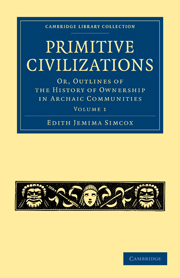Book contents
- Frontmatter
- PREFACE
- Contents
- CHAPTER 1 INTRODUCTION
- CHAPTER II PREHISTORIC PROBLEMS
- BOOK I OWNERSHIP IN EGYPT
- BOOK II ANCIENT BABYLONIA
- BOOK III FROM MASSALIA TO MALABAR
- FROM MASSALIA TO MALABAR
- CHAPTER I THE PHŒNICIANS AND CARTHAGE
- CHAPTER II PREHISTORIC POPULATIONS OF ASIA MINOR, GREECE, AND ITALY
- CHAPTER III THE ETRUSCANS, LYCIANS, AND RHODIANS
- CHAPTER IV THE LAWS OF CHARONDAS
- CHAPTER V LEGENDARY AMAZONS AND HISTORICAL IBERIANS
- CHAPTER VI CRETE AND SPARTA
- CHAPTER VII A SYRIAN LAW-BOOK
- CHAPTER VIII ANCIENT ARABIA
- CHAPTER IX HAMITIC AFRICAN TRIBES
CHAPTER VI - CRETE AND SPARTA
Published online by Cambridge University Press: 07 September 2011
- Frontmatter
- PREFACE
- Contents
- CHAPTER 1 INTRODUCTION
- CHAPTER II PREHISTORIC PROBLEMS
- BOOK I OWNERSHIP IN EGYPT
- BOOK II ANCIENT BABYLONIA
- BOOK III FROM MASSALIA TO MALABAR
- FROM MASSALIA TO MALABAR
- CHAPTER I THE PHŒNICIANS AND CARTHAGE
- CHAPTER II PREHISTORIC POPULATIONS OF ASIA MINOR, GREECE, AND ITALY
- CHAPTER III THE ETRUSCANS, LYCIANS, AND RHODIANS
- CHAPTER IV THE LAWS OF CHARONDAS
- CHAPTER V LEGENDARY AMAZONS AND HISTORICAL IBERIANS
- CHAPTER VI CRETE AND SPARTA
- CHAPTER VII A SYRIAN LAW-BOOK
- CHAPTER VIII ANCIENT ARABIA
- CHAPTER IX HAMITIC AFRICAN TRIBES
Summary
It only remains now to inquire how far the peculiar laws and customs of Crete and Sparta approximate to the archaic or Lycian type, which we have thus far endeavoured to track. The great Dorian cities of Peloponnesus recognised as their common metropolis a tiny territory called Doris, consisting of four townships on the borders of Phocis, just south of the pass of Thermopylæ. It would be strange if a small State thus situated was altogether of a different type from its nearest neighbours on either side, and accordingly the common meals of Sparta resemble those of the Locrian colonies; the Phocæan colonies, like Sparta, had laws or customs tending to the multiplication of heiresses; and the threefold classification of the people in Lacedæmon corresponds exactly to that prevailing in Thessaly.
In the latter country there was a landed aristocracy, supposed to be descended from a band of Thesprotian conquerors. Under these were various tribes, wholly or partly Greek, possessing the Amphictyonic franchise and corresponding in status to the Laconian Perioeci, and at a still lower level, the Penestæ, compared to the Helots of Sparta, slaves or serfs of the State, with no political rights, but a vested interest in the soil they cultivated, subject to dues which, in the case of the Helots at least, were not allowed to be increased.
- Type
- Chapter
- Information
- Primitive CivilizationsOr, Outlines of the History of Ownership in Archaic Communities, pp. 465 - 486Publisher: Cambridge University PressPrint publication year: 2010First published in: 1894



